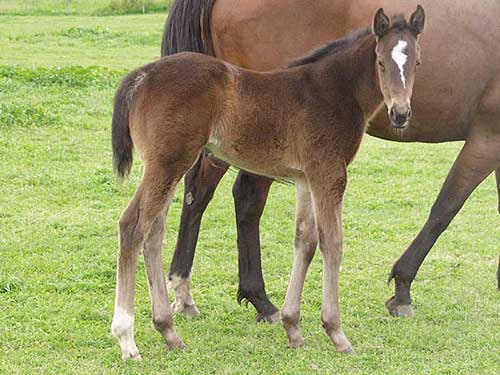
by Eleanor M. Kellon, VMD
When an average size mare delivers, she will have produced a 100+ lb foal, an 11-pound placenta, and as much as 16 pounds of fluid. She has also greatly increased the size and thickness of her uterus, and blood volume increased about 30% during pregnancy. The raw materials to build these things didn't come from thin air.
Providing adequate calories is the easy part. Rapidly dividing cells also have critical needs for amino acids, vitamins and minerals that they must obtain from the placenta.
It's true that the dam will rob her own body tissues, if necessary, to provide for the fetus (not that this is a desirable management tactic!). It's also true that the dam cannot provide something she herself does not have. If she starts the pregnancy with low body reserves and her diet is not adequate, the foal will be short-changed, and the mare will become even more deficient.
Extreme deficiencies result in things like White Muscle Disease and goiter with hypothyroidism in foals. More insidious effects include a higher risk for developmental orthopedic disease like OCD and contractures. Chronic copper deficiency has been linked to uterine artery rupture in mares.
Advice on feeding pregnant mares used to pay no special attention to nutrition until the last trimester. The latest (2007) NRC recommendations begin to allow for increased nutrients in the 5th month, but since there are still gaps in the research, there are also gaps in their recommendations. For example, they don't allow for any increase in zinc or manganese, but obviously foals require those essential minerals in their bodies.
Good quality grass hay or pasture should be the bulk of the pregnant mare's diet. In fact, a hay with 10 to 11% protein and digestible energy (calories) of 0.9 Kcal/lb can meet calorie and protein requirements throughout pregnancy. Even in the last month of pregnancy the mare would only need to consume a little over 2% of her nonpregnant body weight to meet her needs. For every 1% below 10% in the protein, the mare needs 45 grams of supplemental protein. For example, if a 9% protein hay and she's eating 20 lbs, she needs 2 x 45 = 90 grams of supplemental protein. A common range for protein in good quality grass hay is 8 to 12%.
If you don't know the protein level in your mare's hay, it's wise to supplement. "High" (14%) feeds won't help because they have 2.5 to 3 times more calories, but not 2.5 to 3 times more protein, so you feed a lot less. Choose a supplement with a blend of vegetable and whey sources, guaranteed levels of lysine and methionine. If you assume 8% protein, a mare eating 20 lbs/day will need 180 g of protein = 450 g of a 40% protein supplement (1 pound).
You may want to meet part of your extra protein needs with a combination protein and mineral supplement. As a rule of thumb, the mare will need double her baseline mineral intake at the time of greatest demand, so look for a supplement with at least 5% calcium and 225 mg copper per 1 lb serving. A pound of it will provide about 112 g of protein if 25% calcium.
Do not stop your mare's usual mineral supplements when she is pregnant. You still need to have her eating a balanced diet base. The above supplementation is for the additional needs of pregnancy. Compared to what is already invested, this is cheap insurance. A breeding farm client of mine once described foals from mares managed this way as "robust". How many 1-week-old foals can be described like this?
Uckele Health & Nutrition, maker of CocoSoya®, offers supplements that provide antioxidant support.
Amino Fac-41 supports the increased protein needs of growing horses, horses in training, and the pregnant mare to promote muscle integrity and definition. Concentrated source of all the amino acids, including 4% Lysine. Supports lean muscle mass, bone and joint structure, vital organ development, immune system function, and hoof and connective tissue health.
Milk & Grow is formulated to meet the increased protein, vitamin and mineral demands of the pregnant and lactating mare and growing foal. Highly digestible protein supplement with favorable profiles for all the essential amino acids including the most often deficient amino acid, L-Lysine. Combined with a complete spectrum of vitamins, minerals, and Probiotics.
Equi-Base Grass is a comprehensive base vitamin/mineral mix featuring Calcium, Phosphorus, Copper and Zinc, and the B-complex vitamins to support energy metabolism. Digestive enzymes and Probiotics promote healthy gastrointestinal function. Designed to balance diets based on grass hay/forage or a 50/50 alfalfa grass forage provides high concentrations of vitamins and minerals.
About Dr. Kellon - Dr. Eleanor Kellon, staff veterinary specialist for Uckele Health & Nutrition, is an established authority in the field of equine nutrition for over 30 years, and a founding member and leader of the Equine Cushings and Insulin Resistance (ECIR) group, whose mission is to improve the welfare of horses with metabolic disorders via integration of research and real-life clinical experience. Prevention of laminitis is the ultimate goal. www.ecirhorse.org
Uckele Health & Nutrition, maker of CocoSoya, is an innovation-driven health company committed to making people and their animals healthier. On the leading edge of nutritional science and technology for over 50 years, Uckele formulates and manufactures a full spectrum of quality nutritional supplements incorporating the latest nutritional advances. www.uckele.com.
This article originally appeared on www.uckele.com and is published here with permission.
Find more informative articles in our section on Health & Education.

































